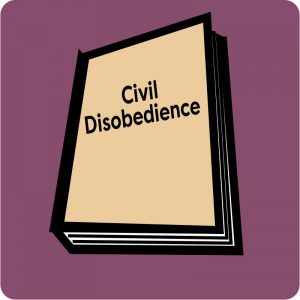
Today’s Walking Classroom discusses Henry David Thoreau’s famous essay, “Civil Disobedience” – an essay about standing up for your beliefs. Thoreau believed that sometimes you had to speak out against the government in order to change unjust laws or behavior, even if this was difficult. Thoreau believed that failing to speak out about a serious problem would allow it to continue, which was almost as bad as causing the problem in the first place.
Character Value: Courage
Click for Standards Alignment
Common Core
L–Language | SL–Speaking and Listening | RI–Reading: Informational | RL–Reading: Literature | W–Writing | RH–6-8 Literacy in History/Social Studies | RST–6-8 Literacy in Science & Technical Subjects Elementary School:RI.3.1, RI.3.2, SL.3.1, SL.3.4
RI.4.1, RI.4.2, RI.4.5, RI.4.8, SL.4.1, SL.4.4
RI.5.1, RI.5.2, RI.5.5, RI.5.8, SL.5.1, SL.5.4
Middle School:
RI.6.1, RI.6.2, RI.6.5, RI.6.8, SL.6.1, SL.6.4
RI.7.1, RI.7.2, RI.7.5, RI.7.8, SL.7.1, SL.7.4
RI.8.1, RI.8.2, RI.8.5, RI.8.8, SL.8.1, SL.8.4
RH.6-8.4
Supplemental Resource Links and Downloads
Quiz: (Make sure you're already logged into your Gmail account, then click to copy this Google form to your Google Drive. Quiz keys are here.)
Civil Disobedience Google Quiz
Slide Deck:
Civil Disobedience Slide Deck
Describes how Ancient Greek philosophers, like Aristotle and Democritus, contributed to modern mathematics and modern day knowledge in general.
Introduce Henry David Thoreau with this PBS.org lesson plan and activities.
Test your knowledge of the life of Henry David Thoreau with this quiz from Quizizz.
Work on the “Calculated Acts” primary source document from PBS Learning Media in groups and answer reflection questions.
Analyze “Civil Disobedience” and Walden with this worksheet from PBS Education.
See More Podcasts in Subject Area: Social Studies
See More Themed Groupings that Contain this Podcast: Literary Figures

